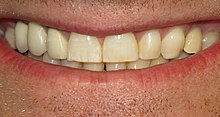Further information:
Water fluoridation controversy


A mild case of dental fluorosis, visible as white streaks on the subject's upper right
central incisor.
Fluoride's adverse effects depend on total fluoride dosage from all sources. At the commonly recommended dosage, the only clear adverse effect is
dental fluorosis, which can alter the appearance of children's teeth during
tooth development; this is mostly mild and is unlikely to represent any real effect on aesthetic appearance or on public health.
[10] The critical period of exposure is between ages one and four years, with the risk ending around age eight. Fluorosis can be prevented by monitoring all sources of fluoride, with fluoridated water directly or indirectly responsible for an estimated 40% of risk and other sources, notably toothpaste, responsible for the remaining 60%.
[57] Compared to water naturally fluoridated at 0.4 mg/L, fluoridation to 1 mg/L is estimated to cause additional fluorosis in one of every 6 people (95% CI 4–21 people), and to cause additional fluorosis of aesthetic concern in one of every 22 people (95% CI 13.6–∞ people). Here,
aesthetic concern is a term used in a standardized scale based on what adolescents would find unacceptable, as measured by a 1996 study of British 14-year-olds.
[11] In many industrialized countries the
prevalence of fluorosis is increasing even in unfluoridated communities, mostly because of fluoride from swallowed toothpaste.
[48] A 2009 systematic review indicated that fluorosis is associated with consumption of
infant formula or of water added to reconstitute the formula, that the evidence was distorted by
publication bias, and that the evidence that the formula's fluoride caused the fluorosis was weak.
[58] In the U.S. the decline in tooth decay was accompanied by increased fluorosis in both fluoridated and unfluoridated communities; accordingly, fluoride has been reduced in various ways worldwide in infant formulas, children's toothpaste, water, and fluoride-supplement schedules.
[56]
Fluoridation has little effect on risk of
bone fracture (broken bones); it may result in slightly lower fracture risk than either excessively high levels of fluoridation or no fluoridation.
[10] There is no clear association between fluoridation and
cancer or deaths due to cancer, both for cancer in general and also specifically for
bone cancer and
osteosarcoma.
[10][11] Other adverse effects lack sufficient evidence to reach a confident conclusion.
[11] A Finnish study published in 1997 showed that fear that water is fluoridated may have a psychological effect with a large variety of symptoms, regardless of whether the water is actually fluoridated.
[1]
Fluoride can occur naturally in water in concentrations well above recommended levels, which can have
several long-term adverse effects, including severe dental fluorosis,
skeletal fluorosis, and weakened bones.
[47] The World Health Organization recommends a guideline maximum fluoride value of 1.5 mg/L as a level at which fluorosis should be minimal.
[59]
In rare cases improper implementation of water fluoridation can result in overfluoridation that causes outbreaks of acute
fluoride poisoning, with symptoms that include
nausea,
vomiting, and
diarrhea. Three such outbreaks were reported in the U.S. between 1991 and 1998, caused by fluoride concentrations as high as 220 mg/L; in the 1992 Alaska outbreak, 262 people became ill and one person died.
[60] In 2010, approximately 60 gallons of fluoride were released into the water supply in
Asheboro, North Carolina in 90 minutes—an amount that was intended to be released in a 24-hour period.
[61]
Like other common water additives such as
chlorine, hydrofluosilicic acid and sodium silicofluoride decrease pH and cause a small increase of
corrosivity, but this problem is easily addressed by increasing the pH.
[62] Although it has been hypothesized that hydrofluosilicic acid and sodium silicofluoride might increase human
lead uptake from water, a 2006 statistical analysis did not support concerns that these chemicals cause higher blood lead concentrations in children.
[63] Trace levels of
arsenic and lead may be present in fluoride compounds added to water, but no credible evidence exists that their presence is of concern:
concentrations are below measurement limits.
[62]
The effect of water fluoridation on the natural environment has been investigated, and no adverse effects have been established. Issues studied have included fluoride concentrations in groundwater and downstream rivers; lawns, gardens, and plants; consumption of plants grown in fluoridated water; air emissions; and equipment noise.
[62]







